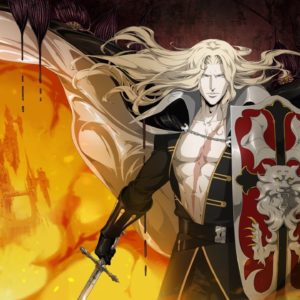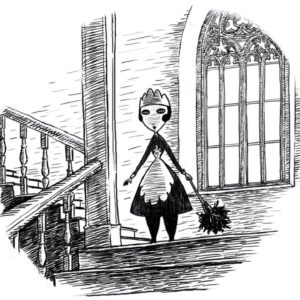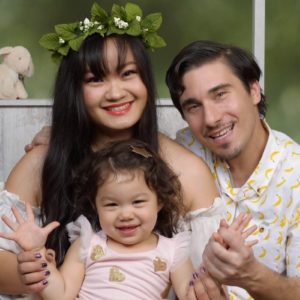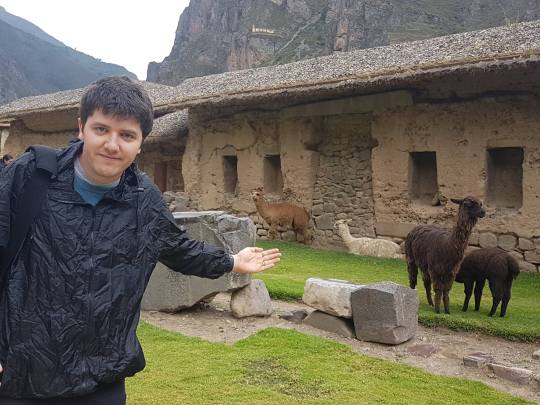
Jack Bernhardt is a comedy writer and sometime performer from the UK who contributed topnotch episodes to season 4 of Bravest Warriors – you’ll meet RoboPartyDuck soon, but not possibly soon enough. He took time away from call outs of Bob Dylan for The Guardian and writing a history book about 10 times that England nearly devolved into anarchy and chaos (but sorted things over tea, presumably) to answer some questions about writing careers, Catbug adoration, and how many times one can repeat ‘gnome’ in a 20 second promo before inciting mob violence.
Did you go to uni and if so, where and what’d you study?
I studied history at Oxford, so I think my two options for a career were “sporadic freelance writer” or “KGB spy”. I really liked my time there, but then I’m a sucker for giant libraries and books that fall apart if you breathe too heavily on them.
Did you always want to be a writer? And what did you want to be as a kid?
I think so! I always wanted to be in comedy or making people laugh. I didn’t ever want to do “serious” stuff – my ambitions were to write on The Simpsons, and then become so rich that I could buy a football team and make Cartoon Network their sponsor (genuinely I designed a football kit with the Cartoon Network logo on the front in MS Paint, I was a very cool child). There was also a brief period in 1998 where I thought maybe I could get a job just being England footballer Michael Owen’s best friend, but apparently that’s not really a career.
When and how did you get your first writing gig?
I actually got my first writing job when I was at school, alongside fellow Bravest Warriors writer Tobi Wilson. My friends and I did some radio sketches online (this was before podcasting, and I’m aware I sound 450 years old at this point), and we sent them into the BBC for a talent competition. We ended up making a sketch show with the BBC when we were 17 or 18, which was a lot of fun but kind of gave us an unrealistic impression of what the comedy world was like – we thought you just sent stuff in and instantly got a show which is NOT TRUE. What’s nice is that we’ve all since gone on to have careers in comedy and the arts: Tobi’s obviously the genius behind loads of Gumball episodes, Tom Crowley is currently a podcasting juggernaut with Wooden Overcoats and just appeared in the US show The Royals, and Rachel Lerman is a producer at the Royal Opera House in London now which is incredible.
What did you do after school? Was there a gap between school and writing full time?
I’ve had a few jobs – after I left uni I worked at a production company making promos for the BBC and UKTV, which actually taught me a lot about writing. A lot of the time on smaller projects they let me do weirder ideas, and I was basically writing a 20 second sketch to promote a TV show, which was an odd skill to learn. I actually still do a little bit of promo work for TV channels – I’ve been working at Comedy Central for a while and there I get to do loads of silly sketch-style promos. I managed to enrage everyone watching the channel a few years ago by doing a promo for Gnomeo and Juliet to the tune of “There’s No Limit” with the word ‘Gnome’ repeated 40 times. I’ve been writing with Tobi for 13 years, and he still thinks it’s the best thing I’ve ever done. I think a lot of people assume that once you bag your first writing job, it’s an overnight transformation into being a full-time writer, but it’s not – and that’s OK!
How would you describe your writing, and why do you love to write?
I’d describe my writing as “intelligently stupid,” in that for the most part, I write about very silly things while trying to make a (semi)-serious point. I think that’s why I love to write as well: I love making people laugh but at the bottom of that I think there has to be something truthful, or something that I believe in. For me, saying “it’s just comedy!” misunderstands what you can do with comedy – you can make people reconsider their own prejudices or their own viewpoints by making them laugh at something new or something they’ve never considered. That’s a very long-winded way of trying to justify why I write fart jokes for a living, but I’m sticking by it.
Do you have a favorite medium to write in, considering you write for everything from mags to TV to radio?
That’s a great question! I only started writing articles last year – that was off the back of some very stupid tweets I had written about the movie Nine Lives, and an editor at The Guardian read them and asked if I had any other dumb opinions about pop culture (and it turns out I did?). The thing that’s fun about them is that it’s entirely personal: I get to make an argument and make people laugh just by the words alone. On TV and radio you have actors delivering the lines and animators and sound designers to ramp up the atmosphere of a scene, so it’s a different kind of pressure. That said I grew up listening to loads of Radio 4 (again, exceptionally cool child), and my Dad also made me listen to a lot of The Goon Show (genuinely cool father), so I have a soft spot for radio.
Do you have a favorite project ever, or one that’s been your baby like none other?
I wrote a 4 episode radio sitcom a few years ago called The Lentil Sorters about a group of people who worked in the Office of National Statistics, and their job of massaging the figures for politicians. That was my first big solo writing project, and it was both a lot of fun and also incredibly stressful. I started writing it in spring 2014 and it didn’t go out until autumn 2015, and that’s a really long time to spend fretting over every single line and beat of a show – it was just me and the producer David Tyler working on it, so it kind of became this all-consuming thing that I obsessed over. It was incredibly weird to hear lines that I had spent 8 months writing, read out in one afternoon by actors and then recorded that evening, and read in ways that I had never conceived of when I was actually writing it. I think that taught me to be less precious with my work – actors are always going to come in and have a fresh way of interpreting it, and that can only make it better.
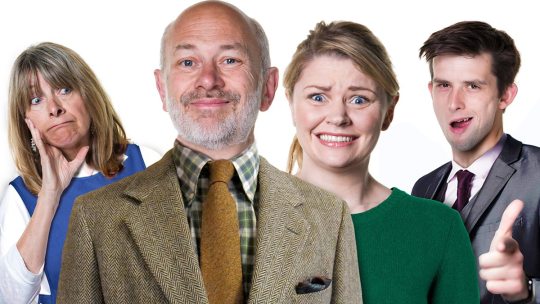
(The Lentil Sorters, BBC)
How have you liked writing on Bravest Warriors?
It’s been a dream – it’s one of the weirdest and funniest shows I’ve ever been allowed to work on, and to have been trusted with this totally bizarre and brilliant universe is a real honour. At first it was kind of daunting: it’s such a vast, crazy universe, with time-travel and parallel universes and entire episodes where the characters are speaking a gibberish language. But the producers have been so amazing: they give the writers so much freedom to explore weird and wonderful ideas that might be outside the show’s comfort zone. That’s what’s so great about Bravest Warriors: there are no rules that can’t be bent and played with, and that’s really rare in such a successful show.
Who was your favorite character to write on Bravest, and why?
I added Catbug into basically every scene whenever I couldn’t think of a way to end a joke. He’s such a beautiful innocent little guy. I love him. If I could I would end everything I’ve ever written (articles, radio shows, serious satirical plays) with Catbug running in and screaming “HUGS”. I also really liked writing for Beth – she’s got this really sardonic attitude, plus in one of the episodes I wrote for she has a really cool emotional arc (no spoilers). But then I also love writing for Danny because he’s a perfect example of a technical engineering genius who is also really stupid. And you can get Wallow to say pretty much anything and it’ll somehow still sound wise and intelligent. And I also liked writing for Chris. So basically, ALL OF THEM.
What do you recommend to young writers hoping to break in?
My biggest piece of advice would be to jump into as many projects in as many mediums as you can – don’t constrict yourself by thinking “I want to be a TV writer” or “I just want to do my own short films”. If there’s a radio competition, try writing something for radio. If there’s a short story competition, give that a go. One of the best writers I know, Bravest Warriors story editor Brydie Lee Kennedy, has written comedy articles, serious essays, musicals, stand-up, plays and sketches: all that experience has made her that much better as a writer. A couple of the writers on The Good Place got the job because they were really funny on Twitter and Vine. It sounds trite, but I believe if you keep making good stuff in any medium, eventually the floodgates will open.
Who are your favorite writers at the moment?
Anything Megan Amram writes for TV is just sensational – her episodes of Parks and Recreation and The Good Place might be my favourite episodes of TV ever? As is Demi Adejuyigbe, who’s another writer for The Good Place and who also does hilarious tweets and videos online. I realise I’ve only mentioned things from the last few years, so I will also say William Shakespeare to make myself sound more cultured. He’s pretty good, 7/10.
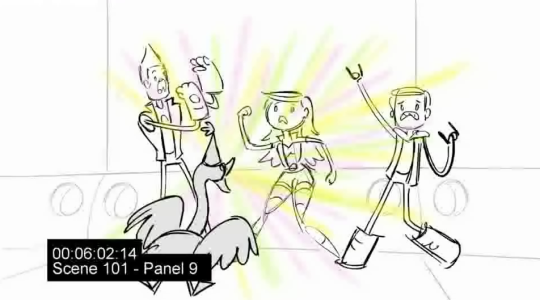
(from the animatic of “Everybody’s Coming, Leave Your Body at the Door”)
What are your favorite cartoons?
Old episodes of The Simpsons, seasons 3 – 9 are still the best, I think. I grew up watching Nicktoons, so Spongebob, Catdog and Rugrats are pretty high up there. I played the Rugrats video game for the original Playstation and it scared the heck out of me. I also loved Freakazoid and rewatched some recently; it’s still so good. More recently, I love Bojack Horseman and Adventure Time.
What are you working on now?
At the moment I’m still writing articles, and also pitching different sitcom ideas to production companies in the UK in TV and radio. It’s a bit of a long process and we definitely don’t make as many as they do in the US, but when they come off it can be very exciting. I’m also trying to write a book about English history, which is a whole new challenge. Apparently if you’re writing a history book you can’t just make stuff up, which makes it really hard.
What is your greatest Dream, if you have one?
This is actually a dream shared by Tom and Tobi from my sketch group, but: my ultimate dream is that I make a film, any film, and at the premiere, sitting in the front row, is the actor who played Detective Hercule Poirot, David Suchet. At the end of the film, everyone else leaves, but David Suchet sits there in stunned silence. I go up to him and say, “Mr Suchet, did you enjoy it?”. He turns to me, and using the Belgian accent we thought he had retired all those years ago, whispers, “C’est bon, Jack. C’est bon.”
Follow Jack on Twitter
Thank you for the interview Jack! Excited to keep up with all the cool things coming up on your docket.
– Cooper

